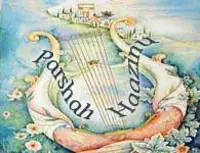WELCOMING SHABBAT
Shabbat is more than a day of refraining from worldly activity.
When experienced to its spiritual fullest, its holiness enlightens all other days of the week.
We invite you to enhance your Shabbat with these words of Torah.

Parashat Haazinu: Beethoven’s Fifth Symphony
- Because Eliyahu never died — he has been around in all generations. We need someone who has an understanding of each generation to pasken the shaylos [issue Rabbinic rulings on Halachic questions] for that generation.
Emor Project » WELCOMING SHABBAT » DEVARIM / DEUTERONOMY » Ha'azinu » Parashat Haazinu: Beethoven’s Fifth Symphony
Parashat Haazinu: Beethoven’s Fifth Symphony
Menachem Tzion on “Binu Shnos Dor V’Dor”
The pasuk in Parshas Ha’azinu says “Remember bygone days; understand the years of each generation; ask your father and he will tell you, your grandfather and he will say it over to you” [32:7]. Even on a very simple and basic level, this pasuk is teaching the importance of having an appreciation for history.
…On a simple level, the next words in the pasuk, which say, “Binu Shnos Dor V’Dor” [Understand each and every generation], seem redundant. It appears to be nothing more than a poetic restatement of the beginning of the pasuk. On a homiletic level however, the Menachem Zion offers a very nice interpretation of this expression.
…“Binu ‘Shnos’ dor v’dor” The Menachem Zion explains homiletically that the word ‘Shnos’ is not derived from the word ‘Shana’ [year] but from the word ‘Shoneh’ [different]. The meaning is that you must understand the changes from one generation to the next.
We can not blindly apply the same rules that worked in the past to present situations. If you try, you will fall short. Each generation is different… Binu Shnos Dor V’dor — learn the lesson of history, but bear in mind the changes from generation to generation.
…Understand the changes (‘shnos’) in each generation. …each generation has it’s own set of problems and own set of rules and own set of circumstances. We must remember the days gone by, but couple that remembrance with an understanding of the changes that take place in each generation.
Eliyahu HaNavi… was the one designated to resolve all of the Talmud’s ‘Teykus‘ [acronym used by the Talmud to indicate a question remains unresolved until Tishbi (Elijah) will provide the resolution]… because Eliyahu never died — he has been around in all generations. We need someone who has an understanding of each generation to pasken the shaylos [issue Rabbinic rulings on Halachic questions] for that generation. Therefore, only Eliyahu, who was present during all generations, is qualified to resolve the ‘Teykus‘.”
Disclaimer:
The above excerpts/quotes are provided by Emor precisely as they appear in the original source, without any modifications or corrections to typos. Text within square brackets, as well as subtitles and bold formatting, are added by Emor for emphasis, clarification, or commentary, and the original content has not been changed.
